
NZ Skeptics Newsletter
The Child Lord of the Universe: Prem Rawat and the Divine Light Mission, Part 1
Bronwyn Rideout
The Divine Light Mission (DLM) is something of an oldie as far as cults go, but it attracted its fair share of controversy in the 1970s and 1980s with notable followers such as respected kiwi composer Jenny McLeod and Billy TK Senior. For me this article has been on the backburner almost as long as the Colin Amery articles, as the DLM often received cursory mention in other cults I have researched. I recall first coming across the group in a folio of personal letters at the National Library. I was looking for mentions of Scientology, but instead came upon the type of family update letter that one receives from distant relatives and friends at Christmas; One year in the 1970s, an especially unfortunate family had adult children variously working with Scientology and living in a DLM ashram.
There are few materials regarding the DLM in the National Library, so I decided to let the matter lie until I had a chance to visit the Beaglehole Room at the Victoria University of Wellington and explore their archival materials of the Free Mind Foundation, an NZ anti-cult group that operated in the 1980s under the leadership of NZ Humanist Association officer Dave McLeod. Here my search was much more fruitful, as McLeod had kept a small collection of local and international DLM newsletters and magazines. Not all of it in good condition, mind you, but I guess the remnants of dirty footprints feel apropos when engaged in the excavation of cult history.
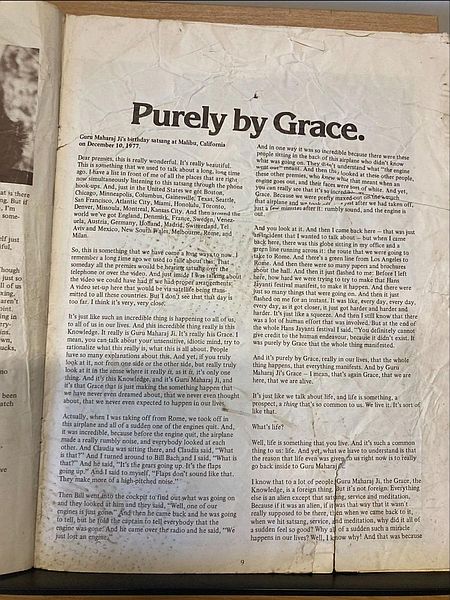
No. 42 of The Golden Age, a DLM publication.
There is a charm to the local newsletters which share updates on the nursery roster and from disciples who were on mission overseas, and even plans to provide regular education or satsangs at Wi Tako prison.
Unsurprisingly, these publications are glowing in their presentation of the DLM. Missing is any indication as to why former disciples could become so vitriolic against their former master, especially one who took as divergent a path as its once perfect master, Prem Rawat, did.
Origin
To be fair, the Wikipedia pages relating to the DLM and its various actors give a fairly thorough, if uncritical, history of the movement.
The DLM was founded in 1960 by Hans Ji Maharaj, in Gadh-ki-Sedhia in India. As a young man, Hans followed a guru and practitioner of Advait Mat named Swami Swarupanand. The swami taught Hans the four secret meditation techniques called Knowledge. Hans' teacher also told him that he would have a son that would play an important role. Upon Swarupanand's death, a group of mahatmas contested Han's succession as leader of their group; he had married his first wife, Sinduri, and this was deemed unacceptable, as it was expected that he would renounce worldly and materialistic pursuits as a guru in his own right. Hans soon left with a small handful of his followers, and started teaching throughout India. Hans became popular as he accepted anyone as his student, regardless of caste or station in life, and he soon had a sizable following of devotees.
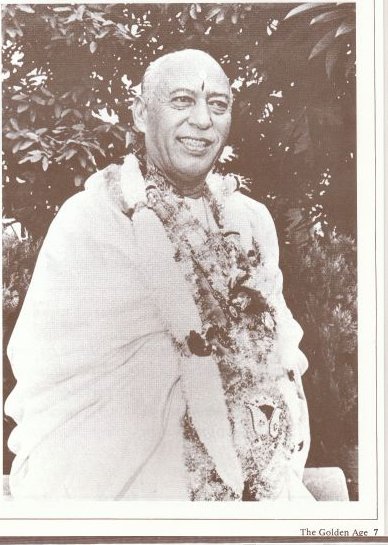
Hans' first wife was unable to have more children after giving birth to their daughter. Recalling the Swami's prophecy, Hans took a second wife in 1946, a 19-year-old woman named Rajeshwari Devi. Between 1951 to 1957, Rajeshwari would give birth to four boys, of which the youngest, Prem Rawat, became Hans' favourite, due to his skills in public speaking.
Hans died suddenly in 1966 after a brief illness. There are various stories about how Prem Rawat, then just 8 years old, was determined to be his father's successor. According to the Wikipedia page, Prem's mother and eldest brother were put forward as successors. Before they could be nominated, Prem (in what looks like a very staged shot) gave a comforting speech to the assembled mourners. This wasn't unusual for Prem; it's reported that Prem had been attending and speaking at Han's meetings from the age of 4. Somehow, Prem's eulogy led to him being declared the Guru Maharaj Ji, and also as a satguru or perfect master.
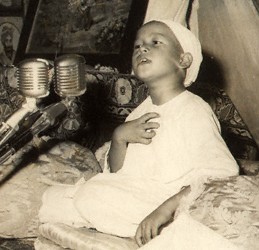
While at first glance it may appear that having a child for a leader would cause resentment (and eventually it would), it initially worked out quite well for the family. Due to Prem's age, running the DLM and enjoying the financial advantages it brought was shared by all family members. Prem's reign of the DLM also came at the most auspicious of times, the 1960s. Senior teachers or mahatmas would travel, teach, and initiate people around the globe. However, some ex-disciples report experiencing cognitive dissonance with how the Mahatmas led seminars or satsangs, taught Knowledge, and then sprung it on them that a preteen was now their divine leader.
Knowledge and DLM practices
Hans drew from multiple political and spiritual sources, including the Bhagavad Gita and Sant Mat. It is often claimed that there were no rules, regulations or religious texts. The speeches of Prem Rawat were transcribed and disseminated, and the guru was seen as a manifestation of the divine. Disciples of DLM, called Premies, were required to perform a minimum of two hours a day in formal meditation, and the rest of the time in informal meditation. Premies who lived in the ashram, or who participated in the formal administration of the organisation, might spend over 50 hours a week participating in group activities or study activities. Premies who lived in the Ashram were required to practice celibacy, abstinence, and vegetarianism, while more casual followers, or those who lived in less strict Premie centres or Premie houses, were encouraged, but not required, to do the same. Premies who still maintained their more traditional careers committed to a tithe of 10% of their income to the group, while those who lived in Ashrams or centres could give anything between 30% and 100% to the group. It is not unusual to hear of pressure placed on even casual followers to donate their life savings or appliances.
The key difference between a casual follower and a full-on devotee was an initiation into a practice called Knowledge, a series of secret meditation techniques. Of course, with anything that is deemed a secret, there are ex-disciples out there who have shared what the knowledge is.
From the 51:09 point in this video, two ex-members described the Knowledge as follows:
- The Light - Close your eyes. With one hand press an index finger to one eye, the ring finger to the other, and the middle finger to the middle of the brow where your third eye will be. Focus your concentration on the centre point of light.
- The Music - Put a thumb into each ear. Close your eyes and put your little fingers over each eye. Join the rest of your fingers over your forehead and top of your head like a bonnet. Concentrate on the inner sound. This is a sound that all Premies must be able to hear on cue.
- The Nectar - The nectar is described as a substance inside your body that can keep you alive without aid of food or water. To capture the nectar, you roll your tongue as far back as you can, past the soft palate. Use your fingers to push your tongue back. Prem Rawat would claim that he has loosened his muscles up so that he could turn his tongue all the way around and into the canals of the nose.
- The Word - The unspeakable name of god, but really just a deep, even breathing exercise. You concentrate on the sound of "so" during inhalation and "hng" during exhalation
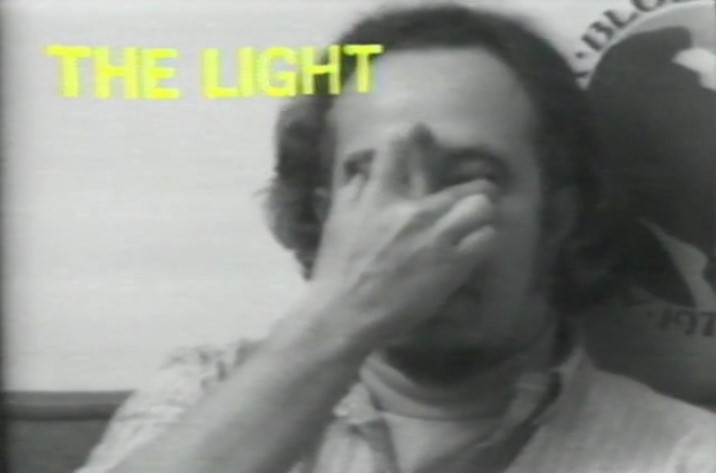
Daily practice for Premies included covering yourself with a sheet upon waking, and concentration for at least 30 minutes on The Word, 30 minutes on The Music, and as much of The Light as you could, and doing The Nectar while doing the other three. Premies would repeat for 1 hour in the evening, and spend the rest of the day concentrating on The Word informally.
Followers were expected to attend nightly satsang meetings. What occurred at Satsang meetings is debated. Detractors report that such meetings were opportunities for indoctrination and shaming, while supporters claim that Maharaj Ji's teachings of peace were reiterated.
As demonstrated above, Prem wasn't above making a few ridiculous predictions. But in retrospect there were times where Prem's reputation escaped him. One particular example was the bomb that was his Millenium '73 festival in Houston, Texas. Remembered as both the most culturally important youth event of the 1970s, and a financial disappointment, Millennium '73 was preceded by multiple egregious predictions attributed to Prem including:
- Extraterrestrials would attend
- The Astrodome stadium would levitate
- 400,000 people would attend (the venue could only hold 66,000)
Prem's eldest brother claimed that earthquakes would occur in the US and the stock market would drop prior to the festival. None of these predictions came true, and no one predicted the nearly $700,000 in debt that would come from hosting a free event.
A New Zealand Premie
Avant-garde composer Jenny McLeod was the best-known NZ recruit of the DLM. This section is a summary of two chapters of a recently released biography which examines this period of her life. A talented musician and composer, McLeod became the youngest professor of music at Victoria University of Wellington in 1971, at the age of 30. In 1972, Jenny had recently developed an interest in Hindu philosophy and Indian music when she was introduced to the DLM through Lindsay and Kim Field, whom she had met during an indecency trial involving a national touring production of the musical Hair. Soon after, DLM missionaries hosted a meeting in Wellington where Jenny had some very inspiring discussions with the visiting mahatmas, and soon after became a fanatical follower.
McLeod would eventually commit her life to the work of DLM, and even offer up her house as a de facto centre, and then ashram. Jenny's address was public knowledge and, in 1975, the house/centre was attacked by an arsonist and former member. However, in the biography, McLeod recollected that it was a man named Neil from Warkworth who did the deed, because he thought the group was possessed by the devil. While all the occupants and most of the house was saved, McLeod did lose her records and her early compositions. McLeod served the DLM as a national secretary, and would travel to the US and Australia attending festivals and completing whatever tasks were requested of her.
McLeod started to become disillusioned with her fellow Premies by the early 1980s. She was often older, more educated, and more worldly than her younger housemates, and struggled with being told what to do. She returned to Wellington in 1981 and, while she retained ownership of the Premie house, she stopped giving the rent to the DLM and instead kept it for herself.
In her later years, McLeod is described as being cagey when discussing this period in her life. Still, McLeod believed that many of Prem's teachings were good and helpful for her, and truly believed that the Lord had returned. At the same time, McLeod experienced tremendous early success, and was trying to find enduring ways to replicate the uplift she felt while improvising. The promise of the DLM was not only a way to overcome the limits of her mind, but also provided enormous creative inspiration for her.
Growing Pains
In 1970, when Prem Rawat was 12 years old, he launched himself into international recognition with what is called the Peace Bomb speech. It is a bombastic speech that includes some big claims, such as:
"I say that peace will come without guns being fired. Is this impossible? No, it is possible, and I am going to show how it is possible. If you stay alive to see it, watch how I will make it possible! Not a single pistol will be made in this world. Lions and sheep, pigeons and cats, will drink water in the same lake and there will be no hostility."
And
"Do you think it is a joke? The great leaders think that I have come to rule and, yes, they are right! I will rule the world, and just watch how I will do it! Even the lion and sheep will embrace each other."
After his maiden speech, however, things started to change. Prem began travelling to the West, against his mother's wishes. People were equal parts intrigued and incredulous about this spiritual prodigy. His immaturity was both attracted and repelled, while many just wanted to replicate the blissed-out state that his early followers demonstrated, who claimed that Prem could help them experience God. Prem's international visibility helped grow the DLM to dozens and then hundreds of Ashrams and centres worldwide.
From the start of Prem's growing international profile, there were frequent critiques and jibes about the guru's lavish lifestyle and spending. The DLM owned three aeroplanes and a film production studio, leased an IBM computer, and Prem had access to multiple luxury cars and watches. To be sure, Prem benefitted from the significant donations he received from his followers. As Prem got older, he endeavoured to have more of a say and more control over what had been, up to that point, a family affair. Prem's mother, now called Mata Ji, and each of his brothers had a say in the DLM operations, and were openly touted as the divine or holy family. Each brother has a special role to play: Eldest brother Satpal/Bal Bhagwan Ji was the organiser; second brother Bhole Ji was the Lord of Music, and the leader of the DLM band called Blue Aquarius; and third brother Raja led the World Peace Corps, who doubled as Prem's bodyguards.

As Prem got older and spent more time in the West, he preached a holier-than-thou message while behaving like the utter teenager that he was, albeit with millions of dollars and the assistance of a loyal entourage. Ex-followers report Prem indulging in sex, drugs, alcohol and rock and roll, all to his mother's dismay. The failure of the Millenium '73 would turn out to be the end of DLM's growth period, but times were still good for the organisation, and new initiates were still being recruited.
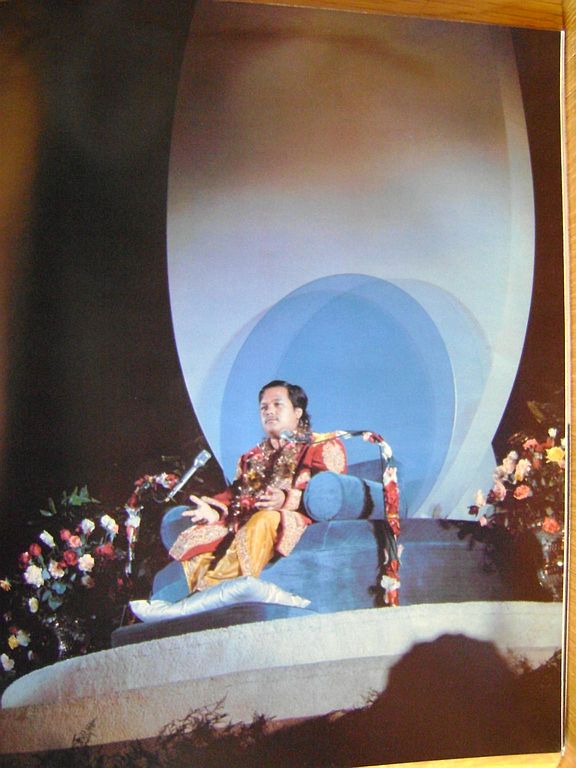
Prem speaks to the assembled at Millenium '73

Millennium '73 was also infamous for the multiple arguments and fights between Premies and counter protestors, who were an odd-couple mix of Christians and Hare Krishnas.
That would all change forever in 1974. In May of that year, 16-year-old Prem married a 24-year-old follower named Marolyn Johnson. His family was not invited and, in a scene reminiscent of The Life of Brian, Mata Ji declared Prem to not be the perfect master, and to instead be a very naughty boy.
But for real, Prem was disowned by his family for his lifestyle, and commenced a legal battle for control over the entire organisation. The Western branches sided with Prem, while the traditionalists returned to India. The Indian courts ultimately decided that Prem would retain control of the Western branches, while his family held onto the Indian side of the divine business, including the Ashrams.
Between 1974 and 1976, Prem started to shed off the trappings of his Indian identity and encouraged his followers to do the same. Some Premies were angry that their leader had feet of clay after devoting years of their lives to abstinence and poverty. By the 1980s, Prem finally discarded his divine status and completely turned away from his Hindu beginnings. He changed the DLM's name to Elan Vital in 1983, and the legacy of the DLM in the West started fading into obscurity.
But that's not the end of the DLM or Prem's story. Come back for part 2 in two weeks to learn about what Prem is doing now, what survivors have had to say in the decades since, and who exactly is running all the anti-Prem Rawat sites out there.
The child god grows up: Prem Rawat and the Divine Light Mission, Part 2
Bronwyn Rideout
At the end of Part 1 of this article, I did gloss over a fair bit of Premie lore once the schism happened between Prem and his family, and that's due to the absence of surviving or available objective sources.
I guess you can thank the current lawsuit that archive.org is embroiled in for that but, fortunately, Rick Ross and the Cult Education Institute can fill in at least some of the blanks.
The Millenium '73 celebration was a financial failure for the organisation, and a reputational one as well. Disregarding the more outlandish rumours about alien visitation, promising to bring about world peace was a big one to make in the US during the final years of the Vietnam War, and feels like an unforced error on behalf of the Divine Light Mission (DLM).
Prem's decision to marry an older woman not only upset his family, but many followers as well. Ashrams around the world served as satellites for the organisation, and examples of spiritual living to other Premies. On the one hand, many had believed that the Lord of the Universe was above such worldly things, and those who chose the more monastic life of the ashrams felt betrayed by the marriage because their guru (like many before and after him) wasn't following the path he dictated for them. On the other hand, those who were less upset still left the ashram to have families, but did not fully leave the DLM; despite the immediate drop in donations, this cohort may have been what has ultimately kept Prem afloat through the late 70s to now, as they were able to donate more disposable income.
Many Ex-Premies are, understandably, mad at their ex-guru, but their criticisms sometimes veer into the misogynistic and bewilderingly transphobic. It's simply very difficult to get a good grip on what was happening with the Divine Light Mission. Was there a power struggle between the wealthier Western branches and the already wealthy Mata Ji and extended family? Is there truth in Prem's claims that his family were only in it for the money, and never truly supported his divine status in private? It's possibly all of the above.
The in-between years
After the 1975 lawsuit which split ownership of the DLM in two, Mata Ji declared Prem's eldest brother as the satguru of the Indian side of the organisation. Satpal currently has a career in politics, and heads a spiritual organisation called Manav Utthan Sewa Samiti. Both Wikipedia and the Manav website mention his father, without mentioning the DLM, but there is a bit of rewriting of history regarding who Hans declared as his heir.
After parting ways with his family, Prem spent a few years trying to establish a new image for his branch of the DLM. One ex-President of the DLM from 1972-1977, Bob Mishler, claimed to have been at the forefront of this transitional period, and convinced Prem that the excessive acts of devotion and similar practices that were introduced by his family were no longer necessary. Mishler also claimed that at one point Prem allegedly considered resigning from godhood in 1976, and plans were made to use the money gifted to him to set up financial investments and become financially independent. However, Prem had gotten used to the good life, and did not want to make the same sacrifices as his followers.
While the Western branches were wealthier, they also carried a lot of debt from staff and ashrams. Prem reportedly vacillated on the issue of Ashrams, but the exact details of what happened are unclear. Some sources claimed that the system was shut down entirely in 1976, while others state it was around 1982/83. With Mishler gone by 1977, Prem briefly reintroduced elements of Indian spiritualism that the ex-President had done away with back into western DLM practice, including reconsidering reopening a small number of ashrams in 1979. This ebbed and flowed through to the late 70s and early 80s. Aside from Mishler, DLM shed several long term senior administrators and devotees, and Prem mainly stayed out of the media spotlight through to the mid 1980s.
However, interest in the DLM was rekindled in 1978/79 after the Jonestown Massacre, with Mishler commenting on the similarities between Jonestown and the DLM. However, Mishler was cagey as to why, merely stating that Prem experienced significant psychological deterioration. An ex-vice president, John Hand Jr, alleged that Prem had a stockpile of weapons (due to his interest in the Mafia) and was abusive to his followers.
After several years of spiritual renaissance, Prem announced in 1982/83 that all DLM media would be destroyed, all ashrams closed, and community activities ceased. Also permanently removed were any vestiges of the Indian garb and spiritual trappings. It is alleged that one of the reasons this was done was because of the liabilities entailed in housing and caring for a group of ageing hippies, being paid for from a decreasing pool of donations.
Throughout the 1980s, Rawat commercialised the organisation as Élan Vital. Instead of mahatmas teaching yoga and the knowledge, there were instead initiators or instructors who provided Knowledge Sessions. Prem also officially began to step away from his divinity, and claimed publicly that he wasn't god. With the abolition of community activities like satsang, Premies could only gather at events or conferences where Prem was present, or simply watch his new videos. Moreover, it was at Prem's orders in the late 1980's that only himself and a chosen few could talk about the knowledge, further funnelling money directly into his pockets. Despite divesting his organisation of any cultural or spiritual trappings, it could not shake the cult label.
Prem purchased two properties in the 1990s to serve as international meeting places, one in Argentina and the Ivory Rock Conference Centre in Amaroo, Queensland. The Queensland property is the only one that remains in operation, and it was the subject of controversy in the early 2000s when a journalist found compromising financial information while fixing the centre's computers.
What is Prem doing now
Élan Vital ceased operation in 2010, and was succeeded by Words of Peace International (now Words of Peace Global). Prem Rawat maintains a low fanfare touring schedule with his followers, and even has an event in Australia coming up in September 2024. Prem has somewhat gone the Sri Chinmoy route, and touts himself as an Ambassador of Peace. But, like his brother, he hides any connection to the DLM. Instead, his image is that of a precocious public speaker in his youth who is just spreading his father's message.

Prem also founded the Prem Rawat Foundation, which is focused on worldwide humanitarian efforts - although its effectiveness and legitimacy are questioned by detractors.
The DLM, Prem, and New Zealand
Like any good guru, Prem has made multiple visits to New Zealand. Once in 1975, another that was profiled on NZ television in 1981, multiple times in the 1980s-2000s as part of Élan Vital, and also as part of Words of Peace. Prem has also spoken in the Parliament Building as part of the United Nations International Day of Peace, which you can watch here.
What do ex-members/survivors say?
For a time, The Lord of the Universe had a right hand man at Wikipedia. Jossi Fresco, a long-term Prem Rawat devotee, was also an administrator for Wikipedia, and maintained control over the Prem Rawat page and other related pages. Fresco was a prolific editor, and even published many of the rules and guidelines that directed the website at that time. Until Fresco left Wikipedia in 2009, he was diligent in keeping any cult allegations off the page.
However, now the pendulum has swung the other way - off Wikipedia at least.
Some of the websites I've found about Prem Rawat have a suspiciously similar look, re-using fonts and other stylistic elements, oftentimes sharing the same articles, and tending to have urls that are an explosion of hyphens - although this may just be their age.
If you search for Divine Light Mission or Prem Rawat, you may only come across one or two of them. The sites I've found so far are:
- https://www.prem-rawat-bio.org/
- https://www.prem-rawat-critique.org/
- https://www.ex-premie.org/ - Run by John Brauns
- https://prem-rawat-talk.org/forum/
- https://premrawat-maharaji.info/index.html
- https://resourcesforthetruthabouPremrawat.com/
These websites serve as a vital, if limited, resource for DLM materials and articles. Some are stuck behind a paywall, while a majority were destroyed under Prem's orders. It is interesting to see a collection of resources which demonstrate that there was always a high-level of pushback to this group, from even its earliest days before Jonestown. There seemingly was always someone ready to call out the failure of the ashram system and the hypocrisy of Prem Rawat.
The Museum of Lost and Fragile Things: A Year of Salvage
Like the School of Economic Science, children and teens who grew up in the DLM are starting to share their own experiences now that they are grown up. Author Suzanne Joinson's book, The Museum of Lost and Fragile Things: A Year of Salvage, now available for pre-sale, will explore her working-class childhood while her parents were members of the DLM in the 1980s.
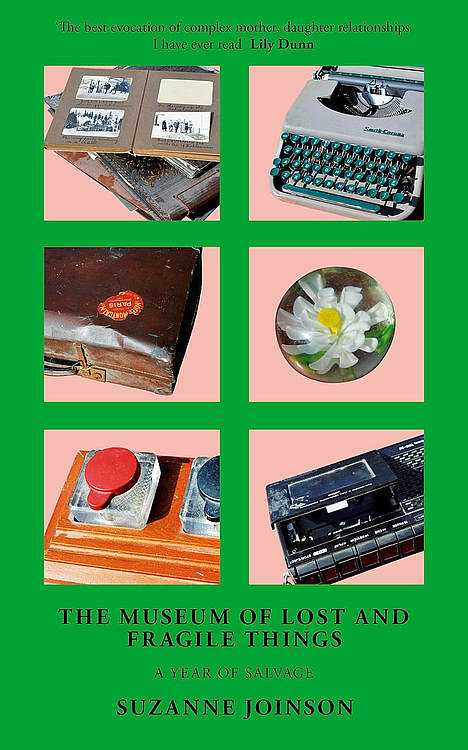
However, and quite sadly, it shouldn't surprise you that some children and teens who grew up in the DLM report being victims of sexual abuse. For quite a while, the most public accusations were against longtime associate Jagdeo, who used to run activities for children. However, as recently as January 2024, Prem has come under fire, as his youngest son Hans accused both parents. Currently, there is no evidence online that this is being pursued legally, and the accusation has only been documented by online, second-hand sources. This is not to discredit Hans Rawat, but to signify the difficulty in even verifying that the accusation has been made by the actual Hans Rawat.
Final thoughts…
While the DLM and Elan Vital are no longer an issue, Prem Rawat is still given the occasional platform in New Zealand. Embarrassingly, that attention has been given by individuals who maybe should have done their research before presenting him in the beehive as any sort of authority on peace. There has always been disdain thrown at Prem and the DLM by adults who made the mistake of choosing to follow the Lord of the Universe, but little is said publicly about the generation that grew up in the Premie centres and satsangs. Maybe they are easy to hide when celibacy was so strongly touted as fundamental to elevated spiritual practice.
And maybe Joinson's book will instigate a revival of criticism and investigation into the DLM, and all the schemes that came after it.